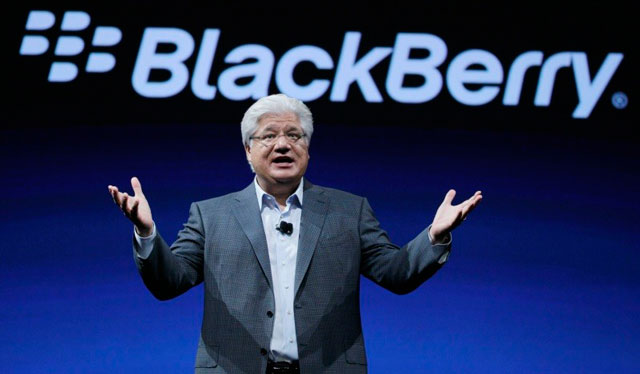 There are few arenas more brutal and merciless than the cellphone market. In just five years, BlackBerry has gone from the world’s leading smartphone brand to a company teetering on the edge of collapse.
There are few arenas more brutal and merciless than the cellphone market. In just five years, BlackBerry has gone from the world’s leading smartphone brand to a company teetering on the edge of collapse.
The fact that BlackBerry is struggling is common knowledge, but the company’s announcement on Friday was still shocking. It has declared a loss of $1bn for the last quarter, mainly because of a build-up of unsold phones. Analysts had expected the company to generate $3bn in revenue, but it managed just $1,6bn.
In response, BlackBerry is cutting 40% of its workforce and discontinuing two of its six handsets. It has been forced to buy back supplier contracts so that they will stop manufacturing more unwanted phones and one of the company’s founders and former chief executive, Mike Lazaridis, is said to be courting private equity firms, hoping to rescue the company through a buyout.
In retrospect we might have seen this coming. In late August, reports began filtering out of the market that demand for BlackBerry’s Q10 keyboard phone was nearly nonexistent. Vendors were returning even the meager stocks they ordered unsold.
The chief marketing officer of Networth, a dealer in second-hand phones, said: “We thought there would be a pocket of die-hard BlackBerry enthusiasts waiting to upgrade, but it seems they have already moved on.”
You might blame this on BlackBerry’s foolish decision to launch its touch-screen Z10 phone six months before the Q10. Given that a physical keyboard is one of the most important features to the BlackBerry faithful, you’d have a point. But the company’s fate was sealed well before that blunder.
In October 2011, BlackBerry announced that it was working on a unified operating system for both its tablets (remember the PlayBook?) and its phones. Sixteen months later, the first BB10-powered phone finally reached consumers and, from what sales figures tell us, they were underwhelmed.
During those 16 months, Apple and Samsung shipped more than 100m cellphones. Both iOS (Apple’s operating system) and Android enjoyed two major upgrades. While its competitors were sprinting, BlackBerry was fiddling around with features that both of them had already perfected.
The particularly frustrating thing is that BlackBerry’s executives were warned, more than once, that their strategy was a bad idea. In mid-2012, Robin Chan, an angel investor and entrepreneur, sketched out a bold rescue plan: ditch BB10, adopt Android, and focus on the business market. But his attempted corporate coup d’etat failed when he couldn’t get together the $6bn needed to force the company into action.
BlackBerry is not the only company to fall into the “we must build and own everything” trap. Nokia wasted years on Maemo and Meego, trying to accomplish what Android had already perfected. By the time it switched to Windows — a move which cost yet more time — Nokia was already in a downward spiral from which it has never recovered.
Many analysts believe that Friday’s announcement means BlackBerry is effectively out of the smartphone market already. The fact that the company had to spend $500m of its $3bn cash pile just to stay afloat in the last quarter is a sign of how dire the situation is.
The smartphone business has enormously high input costs — particularly in marketing and research and development. Without sales in the double-digit millions that cost base quickly becomes unsustainable.

It’s not clear whether going private will even help BlackBerry survive. Unlike Dell, which may benefit from the privacy, BlackBerry’s main problem is not its exposure to a fickle stock market but a fundamental lack of demand for its products.
Four months ago, I bet that Microsoft would become the third player in the cellphone market. It seems I was right, if only by default. Now that it has bought (or, more accurately, bailed out) Nokia, Microsoft is likely to consolidate its position and win a respectable chunk of the market. It may only break into double-digit market share after another five years, but the giant of Redmond has deep pockets and a great deal of patience.
As for BlackBerry, the company may live on as a services business. Its BlackBerry Messenger (BBM) is extremely popular and is now being opened up to customers on Android and iOS devices. This may only hasten the flight away from BlackBerry’s own handsets, but at least the company will have some kind of foothold in the market.
But spare a thought for the millions of ardent BlackBerry fans, many of them here in South Africa, who will have to look elsewhere for well made phones with physical keyboards. Unfortunately, their gladiator just wasn’t quick or mean enough to survive the arena. — (c) 2013 Mail & Guardian
- Alistair Fairweather is chief technology officer at the Mail & Guardian
- Visit the Mail & Guardian Online, the smart news source




